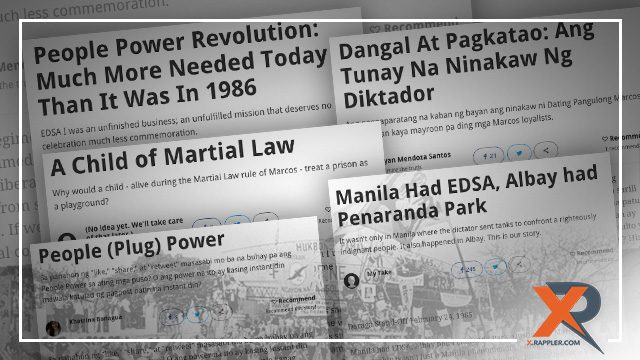SUMMARY
This is AI generated summarization, which may have errors. For context, always refer to the full article.

MANILA, Philippines – It was 30 years ago when over two million Filipinos rallied at EDSA to say enough is enough, that the regime of Ferdinand Marcos had run its course, and that democracy had to be restored.
The 30th anniversary of the EDSA revolution came at a tumultuous time: a national election is less than 3 months away, and Ferdinand “Bongbong” Marcos Jr, son of the late dictator, is the frontrunner in the vice presidential race. (READ: #EDSA30: Should the Marcoses be held accountable?)
Using X, a platform for the Rappler community to publish their stories and amplify their thoughts, netizens have taken the opportunity to remember the past, lament the present, and hope for the future.
Remembering the past
Some users took to X to share how they contributed to the overthrow of the Marcos regime, to educate those too young to remember the abuses that led to the revolution, and to remind those who might one day forget.
People who lost family and friends during the martial law years also shared their experiences online.
Andres Montiel told the story of his father’s imprisonment in Camp Crame during the Marcos years. He recalled how his family had to move from province to province to hide from the military.
For him, EDSA was “a time when a young 9-year-old was finally able to hug his father outside high walls strung with barbed wire.”
Christopher Dy-Liacco Flores, on the other hand, remembered the crowds in Albay. “We were massed at Penaranda Park, cheering as other branches of the converging marches arrived. The people did not trickle in, they came in droves,” he wrote.
Lamenting the present
Others reflected on the resurgence of the Marcoses in Philippine politics, the apathy of Filipino youth, and a lack of understanding on the EDSA uprising.
For Bryan Mendoza Santos, Filipinos must remember that seeking justice over the abuses under the authoritarian regime is not simply about recovering the millions in ill-gotten wealth spirited away by the Marcoses. (READ: Search for Marcos’ wealth: Compromising with cronies)
Santos wrote: “Tungkol lamang ba sa paratang ng pagnanakaw sa kaban ng bayan ang Martial Law? Hindi! Dahil higit at pinakamasama sa lahat ay ang pagnanakaw ng diktador sa dangal at pagkatao ng ating mga kababayan.” (READ: Dangal at Pagkatao: Ang Tunay na Ninakaw ng Diktador)
(Is Martial Law simply about stealing from the country? No! Worse than that was how the dictator stole the dignity and humanity of the people.)
But Santos argued that EDSA I did not achieve what it set out to do. “Surely, EDSA I did not serve its purpose,” he wrote in another story.
Floyd Gonda, however, was frustrated that people considered EDSA I as a failure. (READ: Was EDSA People Power a Failed Revolution?)
He wrote, “I take offense that after thousands of documented cases of human rights abuses and millions of dollars being recovered from ill-gotten wealth, millions of Filipinos still question the validity of EDSA People Power.”
He shared the same sentiments as former justice secretary Agnes Devanadera, who was saddened by the frustration and resentment in the aftermath of EDSA I. Devanadera also expressed concern over favorable views of the Marcos regime.
“It’s very sad because not all countries have memories of a nonviolent revolution to always look up to,” she said.
Mother Mary John Mananzan, former president of St. Scholastica’s College, meanwhile pointed out: “You cannot have a democracy unless the great majority of the people have all their basic necessities fulfilled. That for me is the material basis of democracy, and that we don’t have.”
Former senator Aquilino “Nene” Pimentel Jr, however, welcomed the different opinions on EDSA. “We should not only tend to remember EDSA by its successes,” he told Rappler, “but also by the defects that accompanied the outcomes of the revolution.”
Hoping for a better future
Although some debated the impact and importance of EDSA I, they were also hopeful for the future. They argued that EDSA I is a work in progress, one in which Filipinos would have to participate.
“Come this May national elections, yes – the revolution continues,” Jamil Faisal Adiong said. “Democratization is a long process. It takes active participation among us people to realize our aspirations.”
Gonda agreed, insisting EDSA I was not a “failed revolution.”
He added: “EDSA people power reminded us that our love of country and the common good will always precede that of our fears. That even rape, torture, summary executions and death will not hinder our people from reaching their full potential as a nation.” – Rappler.com
Mark Barnes is a Rappler intern. He is a third year communications student at the Royal Melbourne Institute of Technology majoring in journalism.
Add a comment
How does this make you feel?
There are no comments yet. Add your comment to start the conversation.